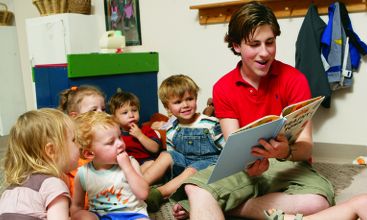Nice Work If You Can Get It
Over the years at Vassar, buildings have been renovated, professors have come and gone, fashions have faded out of style and drifted back in; but some things have remained decidedly constant: tea in the Rose Parlor, serenading, and...student employment?
Students have balanced campus jobs with schoolwork, extracurricular pursuits, and social lives for a long time, and accumulated much-needed money as well as memories — be they fond or funny. Regardless of the job, students quickly learn time-management skills and, statistically, get better grades than nonworkers. More than 1,700 Vassar students, or 65 percent of the student body, have campus jobs this year — with 400 distinct job titles across 120 departments, academic and administrative.
Members of the classes of 1939 through 2010 responded to a call from the Student Employment Office for stories about their experiences as student workers. Along with the usual library, post office, and dining center jobs, Vassar students have found slightly less common ways to earn money.
“I was a rat tamer in the mammalian physiology lab,” said Carol Baldwin ’65. “We took the white rats out of their cages and played with them while their cages were being cleaned so they wouldn’t bite the students when the rats were being used in experiments. I had a great time, but sometimes had to go on to my next class smelling like one of the rats when I didn’t have time to go home and shower and change clothes.”
Debbie Hanson Greene ’74 had an equally hairy experience, as an assistant in the anthropology department. “My job was to carry all the stuffed monkeys and gibbon to the lecture,” she said. “I’d strap the primates onto my old bike — some riding in the front basket, some tied behind me — and pedal down the sidewalks. Students nearly fell over when they glanced up at me. Not something you expect to see as you shuffle your way to an early morning class.”
Others, like Anne Kales Howson ’64, remember specific days on the job. “While at Vassar, I had two very different jobs. One was as a model for the sculpture class. This, I believe, was the highest-paying job on campus at $2 per hour. The other was as a clerk in the Field Work Office. I was actually at work in the Field Work Office listening to a scratchy radio when the word came in that John F. Kennedy had been shot in Dallas. People always ask, ‘Where were you when…?’ That’s the answer for me.”
The same goes for Martha Winn Derman ’42: “December 7, 1941, I worked in the library. It wasn’t until I got back outside to ‘regular people’ that I was told Pearl Harbor had just been bombed. A naïve student, I could not believe this had happened. By spring, however, my English class in Rocky was thunderously buzzed by a pilot celebrating his return to the girl he left behind. It was an eloquent — yet noisy — gesture.”

Vassar limits the number of hours a student may work in a week to ensure that he or she is left with adequate time to be successful student and member of the community. Still, campus jobs become as integral a part of campus life as homework and socializing. “Student employment can be a function of career and personal development; it’s a great way to build a resume and learn various intangibles that only come from on-the-job experience,” says Jon McClain, coordinator of student employment.
